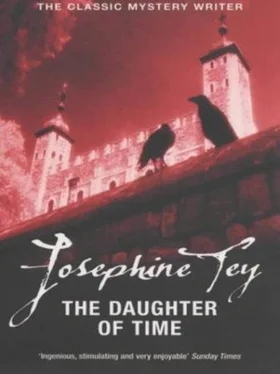‘I was wondering when you were going to ask that,’ he said. ‘I was going to throw it at you on my way out if you forgot to ask. The answer is: almost right away.’
‘So. Another appropriate little pebble in the mosaic. I wonder whether the constableship just happened to be vacant, or whether it was a French appointment because Henry wanted him out of England.’
‘I bet it was the other way about, and it was Tyrrel who wanted to get out of England. If I were being ruled by Henry VII, I’d sure prefer to be ruled by remote control. Especially if I had done a secret job for Henry that might make it convenient for Henry if I didn’t live to too venerable an age.’
‘Yes, perhaps you’re right. He didn’t only go abroad, he stayed abroad – as we have already observed. Interesting.’
‘He wasn’t the only one who stayed abroad. John Dighton did too. I couldn’t find out who all the people who were supposed to be involved in the murder actually were. All the Tudor accounts are different, I suppose you know. Indeed most of them are so different that they contradict each other flat. Henry’s pet historian, Polydore Virgil, says the deed was done when Richard was at York. According to the sainted More it was during an earlier trip altogether, when Richard was at Warwick. And the personnel changes with each account. So that it’s difficult to sort them out. I don’t know who Will Slater was – Black Will to you, and another piece of onomatopoeia – or Miles Forrest. But there was a John Dighton. Grafton says he lived for long at Calais “no less disdained than pointed at” and died there in great misery. How they relished a good moral, didn’t they. The Victorians had nothing on them.’
‘If Dighton was destitute it doesn’t look as if he had done any job for Henry. What was he by trade?’
‘Well, if it’s the same John Dighton, he was a priest, and he was anything but destitute. He was living very comfortably on the proceeds of a sinecure. Henry gave a John Dighton the living of Fulbeck, near Grantham – that’s in Lincolnshire – on the 2nd of May, 1487.’
‘Well, well,’ Grant said, drawling. ‘1487. And he, too, lives abroad and in comfort.’
‘Uh-huh. Lovely, isn’t it?’
‘It’s beautiful. And does anyone explain how the much-pointed-at Dighton wasn’t hauled home by the scruff of his neck to hang for regicide?’
‘Oh, no. Nothing like that. Tudor historians didn’t any of them think from B to C.’
Grant laughed. ‘I see you’re being educated.’
‘Sure. I’m not only learning history. I’m sitting at the feet of Scotland Yard on the subject of the human mind. Well, that will be about all for now. If you feel strong enough I’ll read you the first two chapters of the book next time I come.’ He paused and said: ‘Would you mind, Mr Grant, if I dedicated it to you?’
‘I think you had better dedicate it to Carradine The Third,’ Grant said lightly.
But Carradine apparently did not feel it to be a light matter.
‘I don’t use soft soap as a dedication,’ he said, with a hint of stiffness.
‘Oh, not soft soap,’ Grant said in haste. ‘A matter of policy merely.’
‘I’d never have started on this thing if it hadn’t been for you, Mr Grant,’ Carradine said, standing in the middle of the floor all formal and emotional and American and surrounded by the sweeping folds of his topcoat, ‘and I should like to make due acknowledgement of my indebtedness.’
‘I should be delighted, of course,’ murmured Grant, and the royal figure in the middle of the floor relaxed to boyhood again and the awkward moment was over. Carradine went away joyous and light-footed as he had come, looking thirty pounds heavier and twelve inches more round the chest than he had done three weeks ago.
And Grant took out the new knowledge that had been given him, and hung it on the opposite wall, and stared at it.
She had been shut away from the world; that indestructibly virtuous beauty with the gilt hair.
Why gilt, he wondered for the first time. Silver-gilt probably; she had been radiantly fair. A pity that the word blonde had degenerated to the point where it had almost a secondary meaning.
She had been walled up to end her days where she could be no trouble to anyone. An eddy of trouble had moved with her all through her life. Her marriage to Edward had rocked England. She had been the passive means of Warwick’s ruin. Her kindnesses to her family had built a whole new party in England and had prevented Richard’s peaceful succession. Bosworth was implicit in that scanty little ceremony in the wilds of Northamptonshire when she became Edward’s wife. But no one seemed to have borne her malice. Even the sinned-against Richard had forgiven her her relations’ enormities. No one – until Henry came.
She had disappeared into obscurity. Elizabeth Woodville. The Queen Dowager who was mother of the Queen of England. The mother of the Princes in the Tower; who had lived free and prosperous under Richard III.
That was an ugly break in the pattern, wasn’t it?
He took his mind away from personal histories and began to think police-fashion. It was time he tidied up his case. Put it shipshape for presenting. It would help the boy with his book, and better still it would clear his own mind. It would be down in black and white where he could see it.
He reached for his writing-pad and pen, and made a neat entry:
CASE: Disappearance of two boys (Edward, Prince of Wales; Richard, Duke of York) from the Tower of London, 1485 or thereabouts.
He wondered whether it would be better to do the two suspects in parallel columns or successively. Perhaps it was better to finish with Richard first. So he made another neat headline; and began on his summing-up:
Richard III
Previous Record:
Good. Has excellent record in public service, and good reputation in private life. Salient characteristic as indicated by his actions: good sense.
In the matter of the presumed crime:
(a) He did not stand to benefit; there were nine other heirs to the house of York, including three males.
(b) There is no contemporary accusation.
(c) The boys’ mother continued on friendly terms with him until his death, and her daughters attended Palace festivities.
(d) He showed no fear of the other heirs of York, providing generously for their upkeep and granting all of them their royal state.
(e) His own right to the crown was unassailable, approved by Act of Parliament and public acclamation; the boys were out of the succession and of no danger to him.
(f) If he had been nervous about disaffection then the person to have got rid of was not the two boys, but the person who really was next in succession to him: young Warwick. Whom he publicly created his heir when his own son died.
Henry VII
Previous Record:
An adventurer, living at foreign courts. Son of an ambitious mother. Nothing known against his private life. No public office or employment. Salient characteristic as indicated by his actions: subtlety.
In the matter of the presumed crime:
(a) It was of great importance to him that the boys should not continue to live. By repealing the Act acknowledging the children’s illegitimacy, he made the elder boy King of England, and the younger boy the next heir.
(b) In the Act which he brought before Parliament for the attainting of Richard he accused Richard of the conventional tyranny and cruelty but made no mention of the two young Princes. The conclusion is inevitable that at that time the two boys were alive and their whereabouts known.
(c) The boys’ mother was deprived of her living and consigned to a nunnery eighteen months after his succession.
Читать дальше












